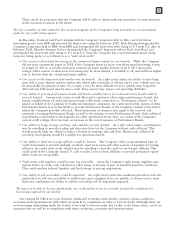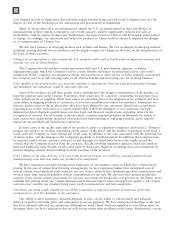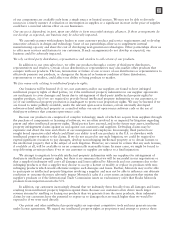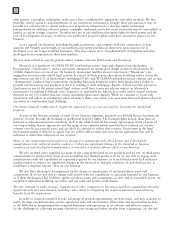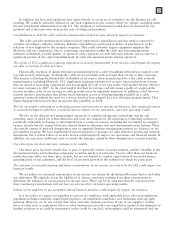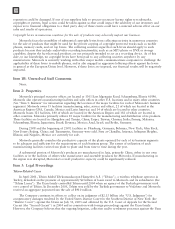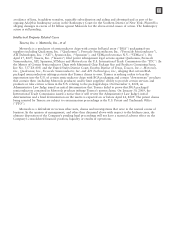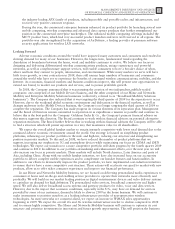Motorola 2008 Annual Report Download - page 39
Download and view the complete annual report
Please find page 39 of the 2008 Motorola annual report below. You can navigate through the pages in the report by either clicking on the pages listed below, or by using the keyword search tool below to find specific information within the annual report.
family will be very lengthy in light of the Uzans’ continued resistance to satisfy the judgments against them and
their decision to violate various courts’ orders, including orders holding them in contempt of court. Following a
remand from the Second Circuit of the U.S. Judgment, on February 8, 2006, the District Court awarded a
judgment in favor of Motorola for $1 billion in punitive damages against the Uzan family and their co-conspirator,
Antonio Luna Bettancourt. That decision was affirmed by the Second Circuit on November 21, 2007. The District
Court, on April 10, 2007, denied the Uzans’ motion to vacate the U.S. Judgment. The Uzans have appealed that
decision to the Second Circuit.
Howell v. Motorola, Inc., et al.
A class action, Howell v. Motorola, Inc., et al., was filed against Motorola and various of its directors, officers
and employees in the United States District Court for the Northern District of Illinois (“Illinois District Court”) on
July 21, 2003, alleging breach of fiduciary duty and violations of the Employment Retirement Income Security Act
(“ERISA”). The complaint alleged that the defendants had improperly permitted participants in the Motorola
401(k) Plan (the “Plan”) to purchase or hold shares of common stock of Motorola because the price of Motorola’s
stock was artificially inflated by a failure to disclose vendor financing to Telsim in connection with the sale of
telecommunications equipment by Motorola. The plaintiff sought to represent a class of participants in the Plan
and sought an unspecified amount of damages. On September 30, 2005, the district court dismissed the second
amended complaint filed on October 15, 2004 (the “Howell Complaint”). Three new purported lead plaintiffs
have since intervened in the case, and have filed a motion for class certification seeking to represent a class of Plan
participants. On September 28, 2007, the Illinois District Court granted the motion for class certification but
narrowed the requested scope of the class. On October 25, 2007, the Illinois District Court modified the scope of
the class, granted summary judgment dismissing two of the individually-named defendants in light of the narrowed
class, and ruled that the judgment as to the original named plaintiff, Howell, would be immediately appealable.
The class as certified includes all Plan participants for whose individual accounts the Plan purchased and/or held
shares of Motorola common stock from May 16, 2000 through May 14, 2001, with certain exclusions. On
February 15, 2008 plaintiffs and defendants each filed motions for summary judgment in the Illinois District
Court. On February 22, 2008 the appellate court granted defendants’ motion for leave to appeal from the Illinois
District Court’s class-certification decision. In addition, the original named plaintiff, Howell, has appealed the
dismissal of his claim.
Silverman/Williams Federal Securities Lawsuits and Related Derivative Matters
A purported class action lawsuit on behalf of the purchasers of Motorola securities between July 19, 2006 and
January 5, 2007, Silverman v. Motorola, Inc., et al., was filed against the Company and certain current and former
officers and directors of the Company on August 9, 2007, in the United States District Court for the Northern
District of Illinois. The complaint alleges violations of Section 10(b) of the Securities Exchange Act of 1934 and
SEC Rule 10b-5 as well as, in the case of the individual defendants, the control person provisions of the Securities
Exchange Act. The factual assertions in the complaint consist primarily of the allegation that the defendants
knowingly made incorrect statements concerning Motorola’s projected revenues for the third and fourth quarter of
2006. The complaint seeks unspecified damages and other relief relating to the purported inflation in the price of
Motorola shares during the class period. An amended complaint was filed December 20, 2007 and Motorola
moved to dismiss that complaint in February 2008. On September 24, 2008, the district court granted this motion
in part to dismiss Section 10(b) claims as to two individuals and certain claims related to forward looking
statements, among other things, and denied the motion in part.
In addition, on August 24, 2007, two lawsuits were filed as purportedly derivative actions on behalf of
Motorola, Williams v. Zander, et al., and Cinotto v. Zander, et al., in the Circuit Court of Cook County, Illinois
against the Company and certain of its current and former officers and directors. These complaints make similar
factual allegations to those made in the Silverman complaint and assert causes of action for breach of fiduciary
duty, abuse of control, gross mismanagement, waste of corporate assets, and unjust enrichment. The complaints
seek unspecified damages associated with the alleged loss to the Company deriving from the defendants’ actions
and demand that Motorola make a number of changes to its internal procedures. An amended complaint was filed
on December 14, 2007. On January 27, 2009, Motorola’s motion to dismiss the amended complaint was granted
in part and denied in part.
31


